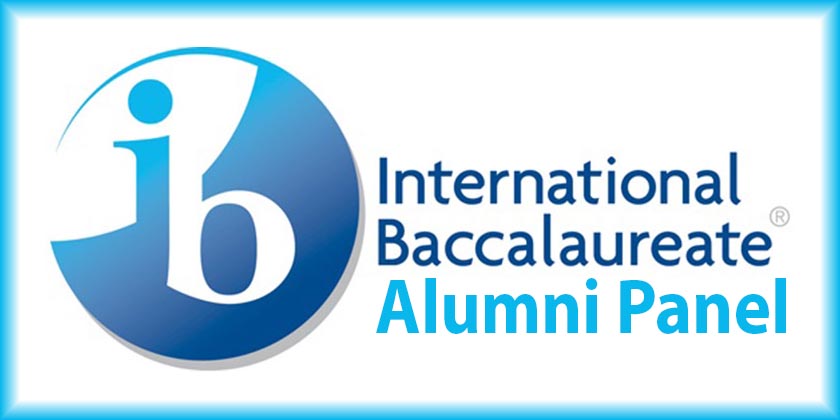
COVID concerns require that the International Baccalaureate alumni panel scheduled for Wednesday, January 5, will not be open to current students and parents. However, the recent alumni will answer questions about the value of IB skills for college life. Their answers will be recorded for viewing on the SGS YouTube channel.
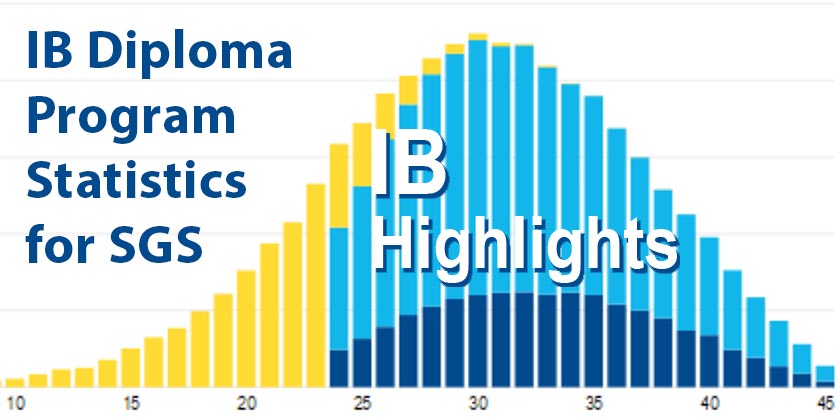
IB Questions of the Week:
Is my student required to be a full IB DP candidate once they enter 11th and 12th grades?
No, some students decide to be a courses-only candidate and not attempt to earn the full IB diploma. Remember, all SGS students, once having met SGS graduation requirements, receive an SGS diploma. The IB diploma is additional. Colleges and universities, if they award credit for IB scores in courses, give the credit regardless of whether a student is a full diploma candidate or a courses-only candidate. Some colleges and universities may give credit for obtaining the full diploma as well, and some, mostly European, may require the full diploma. Always check the specific college or university website for information on IB award credit.
What are the school’s IB statistics for the last 6 years?
Below are stats for the last six years since the first SGS IB Diplomas were awarded in 2016. If you would like information about SGS specifics for particular subjects, please email elizabeth.tender@sgs.org.
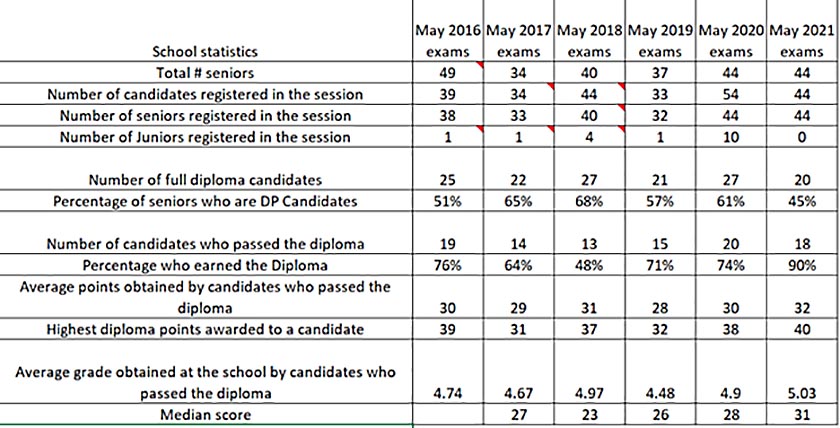
*Note: For some years, you will see juniors registered for exams. This is not a norm, but was in response to specific needs of our students.
IB Alumni Highlight:
On Wednesday, January 5, there will be an IB alumni panel. This event will allow our current students and parents to talk to SGS IB alumni who are now in colleges putting the skills they left SGS with into practice. SGS has organized an IB alumni panel in the past, and we feel that it can be valuable as a resource for students and parents to talk to students who now have reflected on their time with the IB and have a helpful perspective on it.
The panelists will include:
From the Class of 2020:
Kathryn Moon (attending the University of Pennsylvania)
Marshall Roll (attending Macalester College)
Jocelyn Thew (attending Loyola Marymount University)
Miya Jacobs (attending University of San Diego)
Caleb Flegel (attending Whitworth University)
From the Class of 2021:
Gabi Cunningham (attending Georgetown University, School of Foreign Service)
John DeForest* (attending Dartmouth College)
(*will be calling in remotely)
The academic schedule for January 5 will be shortened for all MS and US students. The panel will be available for students in grades 6-12 from 2:05-3:05pm in Founders Theater. Parents who are interested in talking to our panelists and learning more about the IB will have a session from 3:15-4:00pm in the theater. If you are a SGS parent and intend to attend the session from 3:15-4:00pm on Wednesday, January 5, please email elizabeth.tender@sgs.org to RSVP.
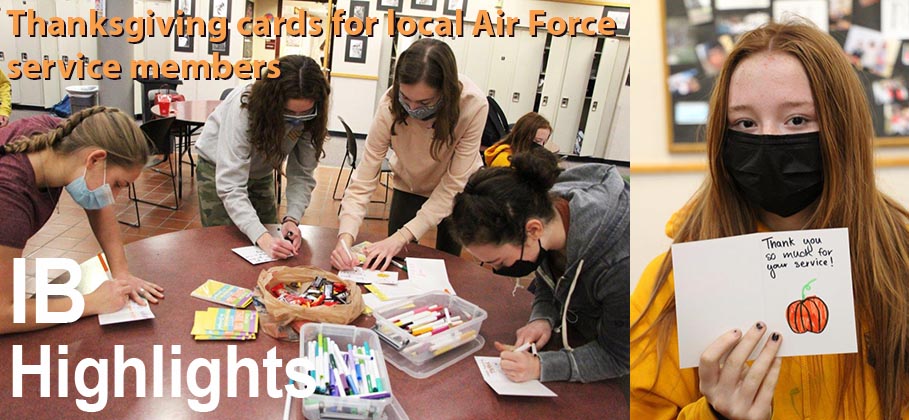
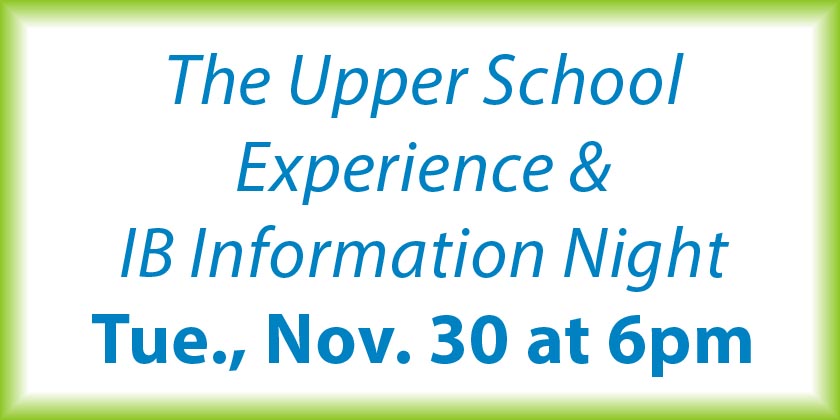
Middle School parents are invited to an Information Night on the Upper School Experience and the International Baccalaureate Program on Tuesday, Nov. 30 in Founders Theater. (This is especially helpful for parents of 8th graders, who will be starting their journey through the Upper School next year.) Learn what makes the SGS Upper School unique and what students can expect in grades 9-12. Here's the schedule:
6:00-6:40pm
Introduction to the Upper School experience; Academics with Dr. Francesca; Clubs, music & arts, mentors, & events with Coach Rickard; Sports with Coach Peplinski.
6:40-7:00pm
BREAK with coffee and treats. Upper School students will share their perspectives on the US experience and CAS projects.
7:00-7:30pm
What’s the International Baccalaureate (IB)?; What’s the advantage of IB versus AP?; How does the IB support the college admissions process?; followed by a Q&A time.
Feel free to attend the first part, the second part, or both presentations. Please RSVP to Paige Halliburton (paige.halliburton@sgs.org) if you plan to attend.
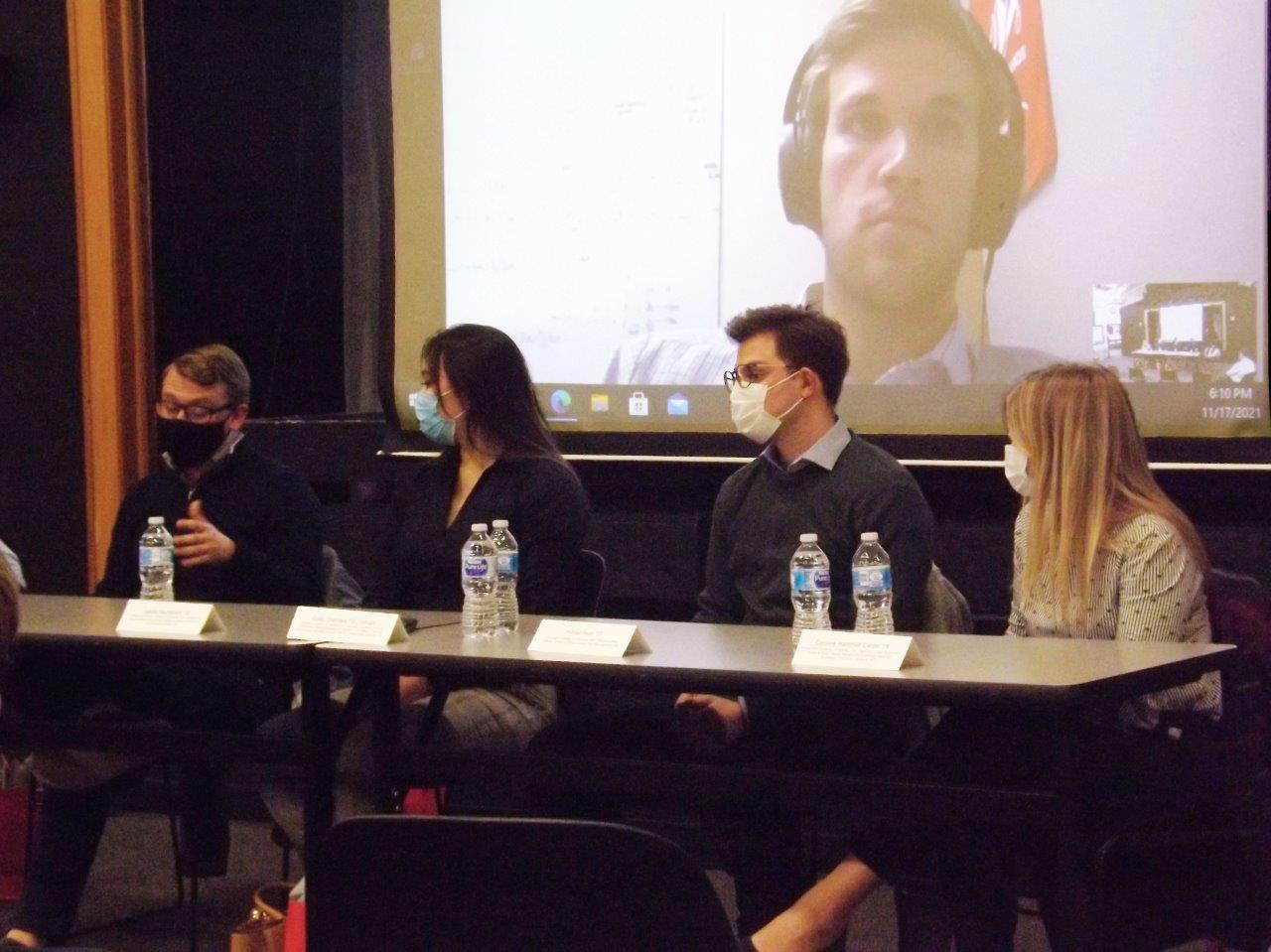
Five recent SGS alumni returned to campus on Nov. 17 to talk with current students and parents about their college experiences, what they are doing after college, and how SGS helped them. See a Photo Gallery of the alumni panel that featured:
• Caroline Hammett Calder ’16: Pepperdine University ’20 (Malibu, CA);
• Collin Cremers ’16: Stanford University ’20 (Stanford, CA);
• Hunter Hyde ’17: Gonzaga University ’21 (Spokane, WA);
• Isabelle Nachtsheim ’16: Eastern Washington University ’20 (Cheney, WA);
• Hunter Olsen ’14: Claremont McKenna College ’18 (Claremont, CA).
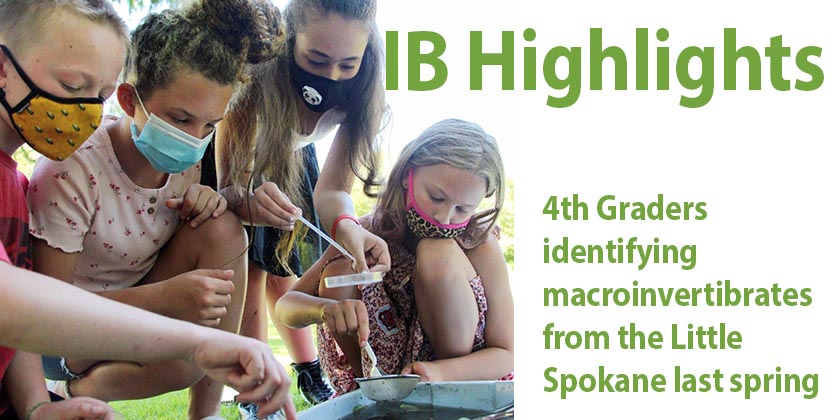
IB Question of the Week: How does the IB and its learner profile trickle down to the learning in the Lower School?
The aim of all IB programs is to develop internationally minded people who, recognizing their common humanity and shared guardianship of the planet, help to create a better and more peaceful world. The IB learner profile represents 10 attributes valued by IB World Schools. The IB and SGS believe these attributes, and others like them, can help individuals and groups become responsible members of local, national and global communities.
All of the IB Learner attributes that the Upper School program emphasizes are also seen in the Lower School classrooms. Below are three that are emphasized in an activity in the 4th grade classroom right now:
• Thinker: We use critical and creative thinking skills to analyze and take responsible action on complex problems. We exercise initiative in making reasoned, ethical decisions.
• Risk-Taker: We approach uncertainty with forethought and determination; we work independently and cooperatively to explore new ideas and innovative strategies. We are resourceful and resilient in the face of challenges and change.
• Knowledgeable: We develop and use conceptual understanding, exploring knowledge across a range of disciplines. We engage with issues and ideas that have local and global signi¬ficance
The attributes of being a THINKER, being KNOWLEDGEABLE, and being a RISK-TAKER are evident as the 4th graders, for example, participate in monthly water testing, which implements the idea of change over time and connects directly to their science units where they study water pollution, invasive species, micro worlds and macro invertebrates. The teachers are training them to be thinkers and risk-takers, while becoming more knowledgeable.
IB Alumni Highlight:
The Saint George’s School Alumni (SGSA) is excited to host a College and Career Panel this Wednesday, November 17 from 6:00 - 7:30pm in the Upper School. This event is open to all 8th through 12th grade students and their families. Hear from several recent SGS alumni about their college experience, their major and career selections, as well as other great insights. There also will be a Q & A opportunity with the panel of speakers. Please come to also ask any questions regarding how their experience with the IB helped them in college. The speakers include these IB graduates:
• Caroline Hammett Calder ’16: Pepperdine University ’20 (Malibu, CA) – Bachelor of Arts, Economics, French & Music; Wealth Management & Advisory Associate, Washington Trust Bank (Spokane, WA);
• Collin Cremers ’16: Stanford University ’20 (Stanford, CA) – Bachelor of Science, Electrical Engineering; Stanford University ’21 (Stanford, CA) – Master of Science, Engineering; Associate Consultant, Bain & Company (San Francisco, CA);
• Hunter Hyde ’17: Gonzaga University ’21 (Spokane, WA) – Bachelor of Arts, Criminal Justice & Political Science; Gap Year (Spokane, WA);
• Isabelle Nachtsheim ’16: Eastern Washington University ’20 (Cheney, WA) – Bachelor of Science, Biology; Occupational Therapy Doctoral Candidate ‘22, Baylor University (Waco, TX).
Hunter Olsen from the Class of 2014 is also speaking, but he graduated before the IB was implemented at our school: Claremont McKenna College ’18 (Claremont, CA) – Bachelor of Arts, Economics; Senior Analyst, Health Evolution (San Francisco, CA).
If you’d like to attend, please RSVP by 9am on Nov. 16 to Tracy Gonser at tracy.gonser@sgs.org or call 509-464-8830.
CAS Experience Highlights: CAS experiences for all of our Upper School Students this week included learning about and working on car tires, participating in Joya Trunk or Treat, and donating blood.
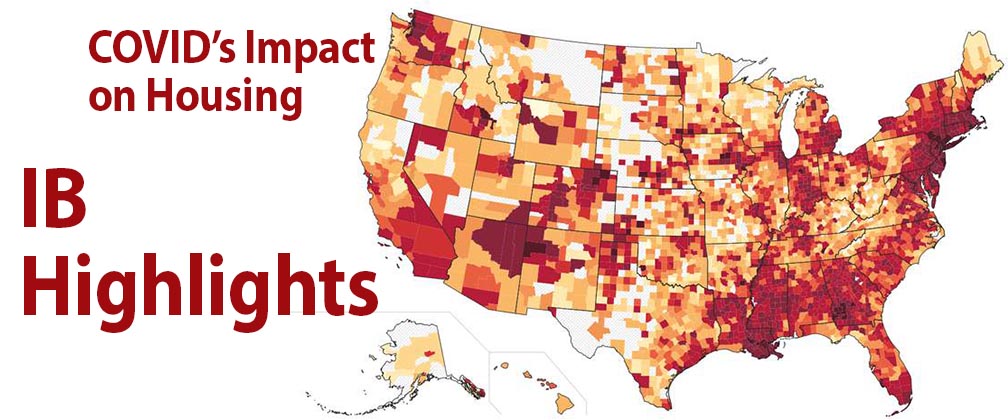
Extended Essay Highlight: Senior Finley Wolff is doing an Economics EE. His research question will be analyzing data on rents to find to what extent government intervention in the Covid pandemic in Dallas, Texas and Seattle, Washington affected the market for apartments? For this analysis, he will define the onset of Covid-19 in Seattle and Dallas as the start of March 2020, because the governments in Seattle and Dallas imposed their first restriction for protection from Covid 19 that month in the form of a stay-at-home order. The onset of the pandemic caused uncertainty for many people about about their health, education, finances, and housing. With Covid-19 becoming politicalized in the United States, Finley found it fascinating how different locations were impacted in such different ways. The impact on the housing sector in many areas was profound. He looked at how people's rents changed and the renters’ responses.
CAS Experience Highlights: CAS experiences for all of our Upper School Students this week included cleaning the robotics room, playing soccer, zip lining, sorting food for the 2nd Harvest Food Bank, helping set up a shed at school, going to a pumpkin patch, participating in cross country, baking oatmeal raisin cookies, writing an extra assignment for school, participating in JOYA Trunk or Treat event, making door decorations for the Ronald McDonald House, decorating cakes, performing in the "Coffee House", playing volleyball, Halloween decorating, cleaning the Spokane River, hiking and taking photos in Riverside State Park, performing at the Tuesday morning meeting with the men’s SGS quartet, attending a 200-hour EMT course, rock climbing, and editing a video for the Washington State Speech Language Hearing Association (WSLHA).
IB Question of the Week: In each IB class, what are the Internal Assessments and the External Assessments?
The IB uses both external and internal assessments in the Diploma Program (DP) to assess student learning.
The external assessments (EA) include the exams in May of a student’s senior year. These EAs count for 70 - 80% of the score in an IB course. The EAs are sent in to the IB for grading by IB examiners. If a student takes IB Visual Arts, their EA is an exhibition. In addition, if a student takes a Language A HL course (Chinese A Literature HL or English A Literature HL), they also produce a written assignment. These assessments are called “external” because teachers outside of SGS assess and decide what grade they earn. IB examiners and assessors are all over the globe but trained by the IB to ensure uniformity.
The internal assessments (IA) include the many investigations and projects that students undertake here at SGS during the two-year program. From 20 - 30% of the student’s score is derived from the IA. SGS students complete an IA in each course. The grade for the IA is assessed by the SGS teacher but it is externally moderated by the IBO (International Baccalaureate Organization), meaning they are reviewed for grading accuracy.
External Assessment
Examinations form the basis of the assessment for most courses. This is because of their high levels of objectivity and reliability. They include: essays, structured problems, short-response questions, data-response questions, text-response questions, case-study questions, and multiple-choice questions.
Internal Assessment
Teacher assessment is also used for all courses. This includes: written work in languages, oral work in languages, laboratory work in the sciences, investigations in mathematics, and artistic performances.
For more information about the DP grading and assessment please follow this link: http://www.ibo.org/en/programmes/diploma-programme/assessment-and-exams/understanding-ib-assessment/
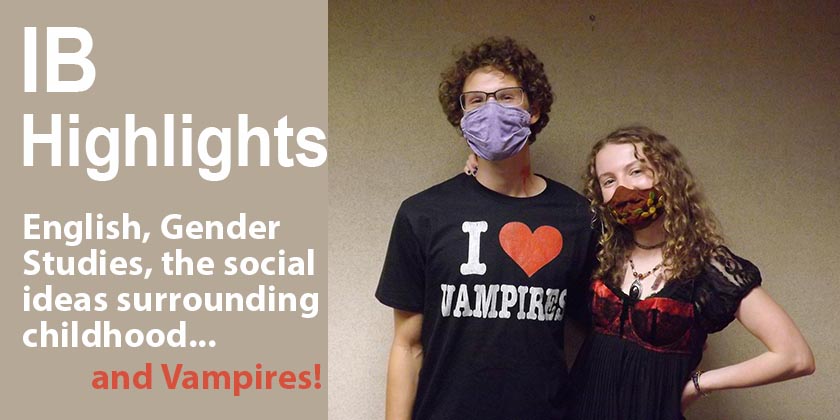

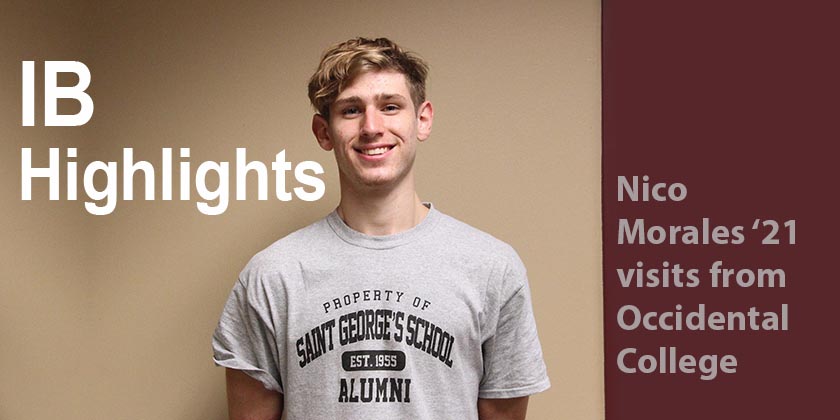
IB Alumni Highlight: Nico Morales graduated last year and is attending Occidental College in California. He had a fall break and came back to school to visit some teachers and coaches. We were able to ask him how college is going and if he had any thoughts on how the IB has helped him in his classes. He said, "the IB of course helped with the admissions process but also preparing me for the level of writing that was expected at college. Our first major writing assignment was an 8-page paper that I had no issue finishing in less than a week while some of my classmates were struggling to even write an outline. That’s when I really felt like all the hours working on the IAs and EEs paid off."
Extended Essay Highlight: Senior Maggie McLaughlin is doing her EE in English A Literature. Her research question is: To what extent does John Ajvide Lindqvist’s Let the Right One In challenge contemporary views through the use of a child vampire? She will explore the deviancy of the child vampire, Eli, in Lindqvist’s novel. The novel analyses the contemporary perspectives society has on childrens’ innocence and their agency and compares it to the characterization of Eli within the text. It also analyses gender and sexuality, specifically with queer children, due to Eli’s non-binary identity. She chose this topic because vampire lore’s construction and broader connection to society has always been of interest to her. The portrayal of monsters in literature allows for analysis of what society deems transgressive. Let the Right One In is a Swedish vampire novel recommended by Chad Rigsby.
CAS Experience Highlights: CAS experiences for all of our Upper School Students this week included helping with Lower School cross country, helping with Middle School cross country, rock climbing, verbally transcribing an essay, horseback riding, painting pumpkins, helping at a county fair, and performing at a coffee house.
IB Question of the Week: What are IB subject briefs?
IB provides short, two-page summaries of many of their most popular subjects including an overview of the topics, a teaching hours distribution and a sample assessment question or two. While not intended to provide a complete picture of the course, they do give some insight to the teaching philosophy and structure of both SL and HL versions of the course. Complete subject guides for actual teaching of every course are available to authorized and candidate IB schools. There are also many other resources available to IB Diploma course teachers; both online and in training sessions. Check this link for the available Subject Briefs.
For detailed IB information, please refer to the International Baccalaureate page on the SGS website and to the IB Resources page in PowerSchool Learning. As an overview, the Diploma Programme (DP) curriculum for grades 11-12 is made up of six subject groups and the DP core, comprising theory of knowledge (TOK), creativity, activity, service (CAS) and the extended essay (EE).